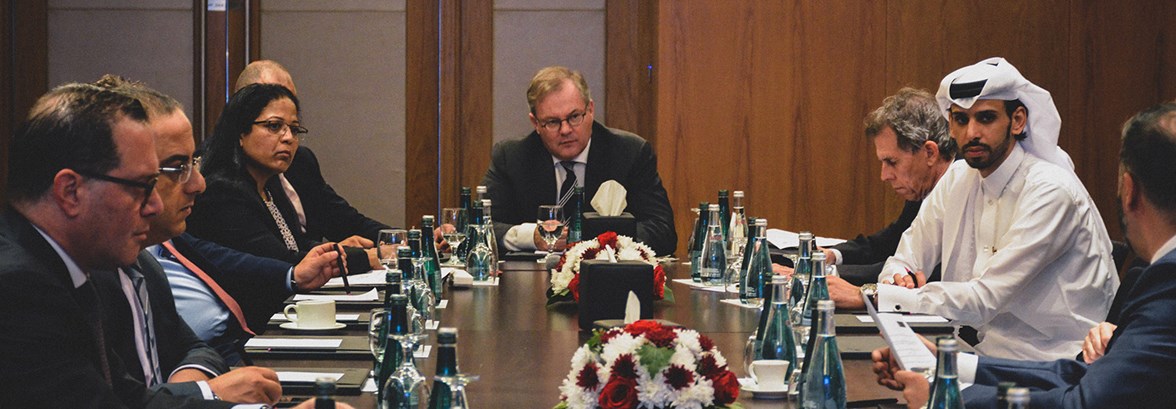QFC Hosts Roundtable to Discuss Emerging Opportunities as Qatar Moves Toward Recovery

Qatar Financial Centre (QFC), a leading onshore financial and business centre in the region, recently hosted the “Economists’ Roundtable: Enhancing the Roundtable’s Work and Impact,” a virtual event that convened experts from Qatar’s business, policy, and research communities to discuss how to seize the opportunities emerging from Qatar’s expanding economy.
The event featured engaging discussions among representatives of some of Qatar’s leading institutions as part of the Roundtable’s workstreams, focusing on areas critical to achieving a sustainable and equitable recovery, including enhancing Qatar’s competitiveness and foreign direct investment (FDI); making better use of data from the Planning and Statistics Authority for more effective policies; and carbon pricing mechanisms.
The Roundtable also featured an informative session on the state of affairs at QFC, and its contributions to Qatar’s economy at large and the post-COVID-19 economic recovery in particular.
Leading business, policy, and research experts delivered insightful presentations and vital industry updates during the Roundtable. Speakers included Nader Kabbani, Director of Research and Senior Fellow, Brookings Doha Center; John Kilani, Director of Sustainable Development, Al-Attiyah Foundation; Thaddeus Malesa, Senior Advisor, Economics & Research, QFC; and Nejla Ben Mimoune, Research Assistant, Brookings Doha Center.
Sheikha Alanoud bint Hamad Al-Thani, Managing Director of Business Development, QFC, shared closing remarks, highlighting QFC’s commitment to a more sustainable economic growth in the country.
In his opening remarks at this year’s virtual Roundtable, Henk Jan Hoogendoorn, Managing Director, Financial Sector Office, QFC, expressed optimism about Qatar’s positive economic outlook and lauded QFC’s continuous contributions to Qatar’s economic diversification and recovery in the post-COVID-19 environment.
In the midst of the pandemic, QFC beat all of the past records as it welcomed 356 new firms to the platform.
Henk Jan Hoogendoorn, Managing Director, Financial Sector Office, QFC
For the past seven years, the Economists’ Roundtable has served as a valuable space where economists, policy analysts, and business leaders come together to discuss issues of importance to Qatar and its economy.
Nader Kabbani, Director of Research and Senior Fellow, Brookings Doha Center
It is appropriate that one of the Roundtable’s workstreams, is exploring the potential of carbon pricing, as a cost-effective tool for climate mitigation.
John Kilani, Director of Sustainable Development, Al-Attiyah Foundation
Henk Jan Hoogendoorn said: “We are seeing the fight against the pandemic gaining traction in most major economies, which is gradually shifting economic activities back to normal and many new opportunities are arising. Accelerated growth in the digital technology sector is one such major trend we continue to notice in Qatar.”
Hoogendoorn continued: “In the midst of the pandemic, QFC beat all of the past records as it welcomed 356 new firms to the platform. Despite the challenges imposed by the global pandemic, the companies registered on the QFC platform continued to hire and expand. With greater number of activities, larger roster, and sustained profits, QFC companies’ tax payments rose to the highest ever. Most importantly, to respond to the increased digitalisation, QFC is revamping its digital interfaces to meet challenges and demands from our customers.”
The Roundtable also discussed the idea of institutionalising the work of the Roundtable under a 2-year revolving sponsorship of an existing stakeholder in order to better expand its programme and outreach.
Nader Kabbani, Director of Research and Senior Fellow, Brookings Doha Center, said: “For the past seven years, the Economists’ Roundtable has served as a valuable space where economists, policy analysts, and business leaders come together to discuss issues of importance to Qatar and its economy. Roundtable participants have examined major policy questions, such as the economic impact of the blockade, the consequences of low hydrocarbon prices, and the productivity of economic sectors in Qatar. One of the key points of discussion today was how to better institutionalise the work of the Roundtable in order to ensure its sustainability and allow its insights to reach a wider audience.”
John Kilani, Director of Sustainable Development, Al-Attiyah Foundation, said: “As nations struggle to rebuild their battered economies after the profound impact of the coronavirus pandemic, the urgency of dealing with climate change remains in the spotlight. We are seeing many countries now committing to ambitious target of net-zero emissions by 2050, as a show of their commitment to implement the 2015 Paris Agreement. The growing number of countries and companies announcing such targets could soon make it unavoidable for most entities not to jump on the bandwagon. However, enormous efforts entailing a host of approaches, would be required to reach the net-zero targets. One such approach is carbon pricing. A growing number of industry leaders, including energy industry leaders, are affirming that a price on carbon would create an incentive for companies to decarbonise, and to finance climate action through carbon credits. It is appropriate that one of the Roundtable’s workstreams, is exploring the potential of carbon pricing, as a cost-effective tool for climate mitigation, with expected outcomes that should contribute to Qatar’s efforts to continue to expand its economy, in line with the country’s commitment to the goal of the Paris Agreement.”



 Contrast View
Contrast View
 Increase Text
Increase Text
 Decrease Text
Decrease Text
 Reset Text
Reset Text



